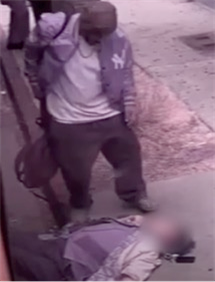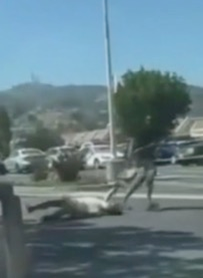
“A Piece of My Mind”
September 2023 Newsletter
Advancing Christian Faith and Values,
Defending Religious Liberty for All,
Supporting Civility and the Common Good
through Preaching, Teaching, Writing,
Activism and Reasoned Conversations

 “Prophets Are Good for Business”
“Prophets Are Good for Business”
Applying Biblical Principles to Work Situations
This Labor Day season I honor those businesses and workers who model ethical and caring practices for the good of businesses, for fair treatment of workers, for workers who provide quality labor, for honorable dealings with the public, and for the glory of God.
 Business Virtues Worth Living
Business Virtues Worth Living
The founding family of “In-N-Out Burger” has made a sizeable donation to Biola University for the School of Cinema and Media Arts that will now bear the “Snyder” name.
Biola’s president wrote,
This naming of the Snyder School and the inspirational vision of Esther Snyder will be a testimony to students and alumni that humility in leadership, Christ-like love of others, entrepreneurial tenacity and upright business principles are virtues worth living.
New Book (available in October) by Linsi Snyder, third-generation family member of the founders and current president of In-N-Out Burger:
The Ins-N-Outs of In-N-Out Burger:
The Inside Story of California’s First Drive-Through
and How it Became a Beloved Cultural Icon
A Liturgy For Those Who Employ Others
by Douglas Kaine McKelvey
What a gift, O Lord, to be so blessed that I might extend this bounty to others
in the form of honest employment, whereby they might also
bless and provide for those who depend upon them.
Teach me each day the way of Christ—how better to serve those I would lead.
Give me wisdom and mercy in my dealings with those I hire.
May I be patient, and gracious, and slow to anger,
recognizing always your image within those I employ.
May I trust first in you as my provision,
that I may relate to others not as tools and commodities,
but as fellow pilgrims and fellow beggars, desperate for divine love.
Teach me to seek the eternal good of my employees,
even over my own profits.
Let me relate to each of these, your unique creations, in light of the priorities, not of the kingdoms of this world, but of the better kingdom of Heaven.
And may I, by the graciousness of my interactions with these employees,
establish a tone and a culture of kindness and grace
that will permeate every room and corridor and hall of this building
like a sweet perfume, like the aroma of Christ.
May those who labor here do so with a sense of peace and purpose and calm,
with a sense that they are valued and respected and appreciated,
and may my dealing with them be a steady witness and invitation,
beckoning each to respond more fully to the call of your Spirit.
O Lord, be present in this place.
Be at work in our work.
Be at your labors in this place of our labor.
Used by Permission
From Volume 1 of Every Moment Holy by Douglas Kaine McKelvey
Rabbit Room Press
www.everymomentholy.com
Religious Liberty Vigilance –
• Living as Christians amongst those who are not
 “It does me no injury for my neighbour to say there are twenty gods or no God. It neither picks my pocket nor breaks my leg.”
“It does me no injury for my neighbour to say there are twenty gods or no God. It neither picks my pocket nor breaks my leg.”
“– Thomas Jefferson (Notes on the State of Virginia & Confession of Nat Turner)
[I generally agree with his comment but I think there are “neighbors” today who do strive to “pick our pockets” in support of their ideology. These neighbors are politicians and activists whose vision for the country, driven by their theology/ideology, must be paid for with money picked from our pockets via regulations, higher consumer prices, unnecessary taxes, etc.]
How should followers of Jesus Christ live with their diverse neighbors in this present world? One useful source of guidance is the excellent 2011 theology book The Christian Faith by Michael Horton, Professor of Theology and Apologetics at Westminster Seminary California (and, I’m honored to say, once a student of mine at Biola University).
I pass on some helpful quotes from his book, mostly without comment.
“The Kingdom of God is no longer identified with any geopolitical kingdom on earth. It is no longer the era of driving the nations out of God’s holy land but of living side by side with unbelievers in charity. It is the hour of grace, not judgment.”
“Already now, the kingdom of God is present, but it is not identified with any nation or ethnic people. For now, it is manifested as a kingdom of grace, bringing the forgiveness of sins, not yet as the kingdom of glory, bringing final justice, righteousness, and peace to the earth.
“There is no nation, building complex, or plot of land to which we may point as the locus of God’s kingdom.”
“Therefore the believer’s attitude toward unbelieving neighbors is determined by common grace*, not by…taking judgment into our own hands… For now, James and John are rebuked for wanting to call down God’s judgment on unbelievers (Luke 9:53-55).”
“Neighbor love, inscribed on the human conscience in creation, still governs all laws and constitutions. It is [the era of] the rule of common law measured by equity (justice tempered by love), to which believers and unbelievers are bound in secular friendships.”
“The imprecatory Psalms**, invoking God’s judgment on enemies, are appropriate on the lips of David and the martyrs in heaven. However, they are entirely out of place on the lips of Christians today, guided as we are not by the ethics of intrusion but by the ethics of common grace*.”
“…we recognize the precariousness, and often the ambiguity, of this era of redemptive history in which we must live as the church. It is an in-between time. …[w]e are living in a different era, when God patiently endures the injustice, idolatry, and immorality of the nations so that his gospel can be brought peacefully to the ends of the earth.”
* “Common grace” refers to blessings from God available to all people, whether they believe in him or not. Please check my blog on common grace: “God’s Saving Grace and God’s Common Grace.” Also my writing: “Politics and God’s Kingdom.” Both are available at my Website: www.donaldshoemakerministries@verizon.net
** My only disagreement with the above is Horton’s comment that the imprecatory Psalms don’t belong on the lips of Christians today. I believe we may honestly petition God with our frustrations over evil people, things and happenings and beseech his righteous intervention as he deems best, not on our schedule but his, and not with our methods but his. For this purpose, we may find the words of our petition to God in an imprecatory psalm.
I believe the Apostle Paul would direct us to this kind of imprecation—putting judgment in his wise hands, not in ours:
Repay no one evil for evil, but give thought to do what is honorable in the sight of all. If possible, so far as it depends on you, live peaceably with all. Beloved, never avenge yourselves, but leave it to the wrath of God [I think this is an imprecation of sorts], for it is written, “Vengeance is mine, I will repay, says the Lord.” To the contrary, “if your enemy is hungry, feed him; if he is thirsty, give him something to drink; for by so doing you will heap burning coals on his head.” Do not be overcome by evil, but overcome evil with good. (Romans 12:17-21 ESV)
• Southern California’s Religious Heritage
 A couple of decades back the Los Angeles County Board of Supervisors removed from the county seal a cross located at the peak of the roof of Mission San Gabriel. This was a symbol of erasing religious culture before words like “cancel” became common.
A couple of decades back the Los Angeles County Board of Supervisors removed from the county seal a cross located at the peak of the roof of Mission San Gabriel. This was a symbol of erasing religious culture before words like “cancel” became common.
No amount of cancellation can change real history. The mission was founded in 1771. Ten years later, in 1781, a culturally diverse group left the mission to found Los Angeles, “City of The Angels,” on September 4, 1781.
Archbishop José Gomez recently led a celebration of the cultural diversity,
42 languages, and almost 40 ethnicities among the 5 million people within the archdiocese today.
We are the losers if we fail to learn and appreciate our cultural heritage, especially its religious dimensions. We must celebrate its positives even as we face up to its failures.

Messages of the Month –
#1 – Is God “for” Capital Punishment?
The Lord tests the righteous,
but his soul hates the wicked and the one who loves violence. – Psalm 11:5
O you who love the Lord, hate evil! – Psalm 97:10
Whoever sheds the blood of man,
by man shall his blood be shed,
for God made man in his own image. – Genesis 9:6
August 9, 1969 – Leslie Van Houten and other members of the cultic Charles Manson family entered the Los Angeles home of Leno and Rosemary LaBianca. As she held down Rosemary, others murdered Leno. Van Houten and others then stabbed Rosemary 41 times.
Van Houten was sentenced to death. The death sentence was commuted to a life sentence when the California Supreme Court overturned all death sentences prior to 1972. Van Houten, now 73, was paroled on July 11, 2023.
September 11, 2001 – Terrorists murdered 2,977 people in attacks on the World Trade Center and the Pentagon and in the crash of United Airlines Flight 93. Now it appears that, after decades of delays and legal disputes, four masterminds of 9/11 will escape execution.
October 27, 2018 – Robert G. Bowers entered the Tree of Life Synagogue in Pittsburg and shot eleven Jewish worshipers to death. On August 2, 2023 a federal jury recommended Bowers be executed.
Capital Punishment—Is it a cornerstone of justice or a relic of barbarianism? Just retribution or revenge? Supported by Jesus, who said he came to fulfill the Law of Moses and not annul it, or superseded by Jesus who said, “love your enemies” (Matthew 5:17, 44)?
Nine Insights from Scripture and Reason:
#1 – Capital punishment for murder is the only commandment found in “The Pentateuch,” the five Books of Moses (Genesis 9:6; Exodus 21:12; Leviticus 24:17; Numbers 35:16-21, Deuteronomy 19:11-13).
#2 – Capital Punishment (for willful, pre-meditated murder of another human being) is not contrary to the value of a human life, but because of the value of a human life. “Whoever sheds the blood of man, by man shall his blood be shed, for God made man in his own image” (Genesis 9:6).
#3 – Capital punishment (and other forms of retributive justice) are not forms of barbaric, lawless vengeance.
Rather, they were taught in Moses’ law as forms of proportionate justice (“an eye for an eye,” not “a life for an eye”) rendered by legitimate officials (“as the judges decide”). See Exodus 21:22-23.
#4 – Several safeguards were established to help ensure a just judgment. Bear in mind that the Law of Moses existed, of course, before forensic science existed. Fingerprints and DNA evidence and video evidence are more exacting than even eyewitness accounts. But eyewitnesses are still vital.
Here are some safeguards taught in the Law of Moses:
• The proof for guilt was determined by rigorous standards, perhaps even a higher standard than today’s “beyond a reasonable doubt.”
• Conviction required the testimony of at least two witnesses (Deuteronomy 17:6). One was not enough. So it was possible that a guilty person could go free because of a lack of sufficient evidence.
• The truthful testimony of eyewitnesses was ensured two ways:
o The eyewitnesses had to be the first persons to throw the stones at the execution. Modern application: The eyewitnesses must “drop the pellets” (Deuteronomy 17:7).
o The eyewitnesses would receive the penalty of death if they perjured themselves at the trial (Deuteronomy 19:16-19).
• Difficult cases must be referred to expert judges (Deuteronomy 17:8-9).
Reasonable safeguards in the spirit of these biblical safeguards are therefore justified—not as ongoing stalling tactics but for the sake of justice.
#5 – “Justice delayed is justice denied.” Ongoing stalling tactics and other delays (by either side) compromise the cause of justice and make any final sentence to be more the result of skill at legal maneuvering than of justice.
The “deterrent effect” of a death sentence is lost if it is delayed. “Because the sentence against an evil deed is not executed quickly, therefore the hearts of the sons of men among them are given fully to do evil” (Ecclesiastes 8:11).
It is hard to see how an execution carried out decades after the murder can have any deterrent effect or even serve the cause of justice well in other ways. Contrast this with the execution of Giuseppe Zangara, who attempted to kill President-elect Franklin D. Roosevelt on February 15, 1933 and who actually did murder the mayor of Chicago in the incident. On March 20 of 1933 Zangara was executed.
#6 – Jesus’ teachings about love and forgiveness must not be interpreted contrary to the clear teachings of the Mosaic Law. Jesus didn’t come to annul the law, nor may we teach others that the law has been annulled by Jesus’ teachings about love, turning the other cheek, etc. (Matthew 5:17-20).
#7 – An unsolved murder requires contrition by the nearest community (Deuteronomy 21:1-9). This is a fascinating concept that we sometimes see today when an unidentified murder victim receives a dignified burial and is mourned by the citizens of the community. It deserves modern reflection and practice and is a positive statement on how a community values human life.
#8 – God takes no pleasure in the death of the wicked (Ezekiel 33:11), and we shouldn’t either. An execution isn’t a time to celebrate (for which we have many bad examples). Rather, it is a time to mourn and commit ourselves to working and praying for a more just society that finds ways to deter major crimes like murder, protect the innocent, and punish the guilty.
#9 – Rating political candidates over their opposition to or support of capital punishment is simplistic and naïve, overlooking the complexities of the criminal process among other reasons. The same is true for most other “up or down” political scorecard ratings, but that’s a different subject!
#2 – The Lord Hates Robbery and Violence against the Innocent, Poor and Helpless
O Lord, who is like you, delivering the poor from him who is too strong for him, the poor and needy from him who robs him? – Psalm 35:10
Woe to those who decree iniquitous decrees,
and the writers who keep writing oppression,
to turn aside the needy from justice
and to rob the poor of my people of their right,
that widows may be their spoil,
and that they may make the fatherless their prey! – Isaiah 10:1-2
I the Lord love justice; I hate robbery and wrong. – Isaiah 61:8
Thus says the Lord: Do justice and righteousness, and deliver from the hand of the oppressor him who has been robbed. And do no wrong or violence to the resident alien, the fatherless, and the widow, nor shed innocent blood in this place. – Jeremiah 22:3
“Smash and grab” robberies in California of large stores or small stores of average folk just trying to make a living have been widely reported. Two robberies against elderly women have occurred, leaving them seriously injured. There should be no doubt about the wrongfulness of these deeds in the minds of those whose moral values have been formed by biblical teaching. Biblical imagery: blood unjustly shed cries to God for vengeance. Laws and policies that stimulate such conduct are especially denounced in Isaiah 10:1.


Now Only a Memory

Blossoming tree in February 2023
A blossoming tree greeted us in early February of 1972 when we returned to California from Ohio after my father’s death on February 3. We left Ohio in a bad snowstorm and endured winter conditions on the way home. The blossoming tree in winter was a profound reminder of the Bible’s promise of resurrection life.
 Every February for the next half-century I’ve been reminded of this as I saw this tree near my home in full blossom.
Every February for the next half-century I’ve been reminded of this as I saw this tree near my home in full blossom.
Alas, Tropical Storm Hilary would take the tree down 51 years later!
www.donaldshoemakerministries.com
Don has been a member of the clergy in the Long Beach, California area since 1970. He now serves as Pastor Emeritus of Grace Community Church of Seal Beach (where he was senior pastor 1984-2012) and as Senior Chaplain of the Seal Beach Police Department (2001+). He previously was an assistant professor of Biblical Studies at Biola University (1976-84) and chaired the Social Concerns Committee in the Fellowship of Grace Brethren Churches from 1985 to 2019.
His graduate work includes a Master of Divinity magna cum laude from Grace Theological Seminary, a Master of Theology from Fuller Theological Seminary with a concentration in Christian ethics, and a Doctor of Ministry from American Baptist Seminary of the West (now Berkeley School of Theology) with a concentration on the Charismatic Movement. His law school studies included a course on the First Amendment. He and his wife Mary have been married for over 56 years. They have two children and six grandchildren.
© 2023 Donald P. Shoemaker

